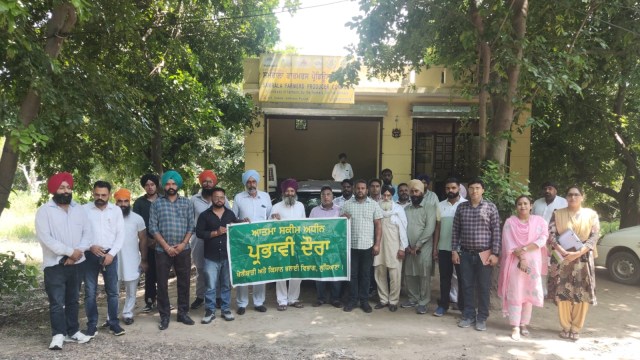Can FPOs be an answer to farmers’ MSP huddle: a Ludhiana unit shows
Within one year of its formation, the FPO has become a beacon of hope for local farmers.
 Members of FPOs along with visiting farmers groups at the FPO.
Members of FPOs along with visiting farmers groups at the FPO.Farmer Shingara Singh of Beelan village in Ludhiana sold two quintals of moong for Rs 9,000 per quintal through a Farmer Produce Organisation (FPO), which is much higher than the minimum support price (MSP) of Rs 8,682 per quintal.
On the other hand, the moong he took to the mandi was sold for just around Rs 6,000 to Rs 8,000, a price much less than the MSP. He said that he came to know of FPO when he had almost sold his entire moong crop, with only two quintals left. “If the FPO can offer me more than MSP, why are traders in the mandi offering less?” asked Shingara, who cultivates potatoes, maize, and moong on 35 acres, including 10 acres of his own.
Farmer Sarabjit Singh of Khalsapur village in Fatehgarh Sahib sold turmeric through FPO for Rs 250 per kg. He said that if such FPOs were established in every block of the state, no farmer would grow paddy, as cash crops such as pulses, edible oils, and maize are more profitable but finding a market is challenging.
“I grow turmeric on one acre and produce 16 quintals of pure organic turmeric powder valued at Rs 4 lakh. Can paddy provide a farmer with a produce worth Rs 4 lakh from one acre? But since paddy has an assured MSP, farmers are drawn to it,” he said, adding that if more FPOs are established and run with sincerity, no small or marginal farmer would be in distress.
Like Shingara and Sarabjit, there are 150 other farmers in Ludhiana who sell their produce through FPO named ‘Samrala Farmers Producer Company’.
Within one year of its formation, the FPO has become a beacon of hope for local farmers. Registered under the leadership of Sukhjit Singh Diwala, a progressive farmer, and five other visionary farmers, this FPO provides 150 farmers with a sustainable income on a fair platform. With three dedicated outlets in Samrala and surrounding areas, the FPO has already registered an impressive turnover of Rs 2.5 crore in its first year, and are aiming a turnover of Rs 3.5 crore this year.
The FPO purchases pulses, oils, honey, turmeric, jaggary, basmati rice, moong, maize, pickles, juices, and homemade soaps, directly from farmers. For crops that have a MSP, the FPO ensures that farmers receive the guaranteed price or more. For other products, the price is determined by the farmers themselves, ensuring they receive a fair return of their hardwork. The FPO operates on 5% profit margin, prioritising welfare of its members.
“We provide farmers with a reliable market, especially for crops that the government does not procure at MSP. Quality is our top priority, and we work closely with our members to ensure they maintain the highest standards,” said Diwala.
The FPO is registered with NABARD, and its operations are supported by the Gramin Vikas Trust. With the help of Krishi Vigyan Kendras, the FPO also provides training to farmers interested in diversifying their crops.
“Farmers who struggle to get MSP for their crops in traditional mandis now have a reliable alternative in our FPO,” he said, adding that before forming the FPO, they took training from Krishi Vigyan Kendra. “Scientist Devender Tiwari of Department of extension in Punjab Agriculture University, and KVK Engineer Karan helped us with technical knowledge of running a FPO and how business can be planned and linked with market, processing units etc.” he said.
Farmer Jaswinder Kaur, (65), one of the dicrectors of the FPO, has seen the benefits firsthand. Farming on her family’s six acres, Kaur has formed a 10-member self-help group registered with ATMA. They produced two quintals of various pickles, ‘murabbas’ (a sweet fruit preserve), juices, hand made soaps using products from her orchard, all without preservatives. “The FPO give us prices that we quote, which is a far cry from the poor treatment farmers get at the hands of traders in mandis. Instead of crying for MSP, more farmers should opt for FPOs to sell their products,” she said, adding that there products are so good that they now have a loyal customer base.
“As the FPO grows, it will keep on creating funds to purchase larger quantities of farmers’ products, ensuring that they can scale their operations and provide even more farmers with a fair and supportive market,” said Diwala.
Experts feel that if FPOs are run with commitment to quality, fair pricing, and farmer empowerment, then it can give the state a more sustainable and equitable agricultural future. “FPOs provide a stable market to farmers, help in crop diversification, save them from exploitation at mandis, price negotiations, help in forming better market links with wholesalers, retailers, and processors, reducing dependency on middlemen and help farmers in quality maintenance,” said a senior officer in the Punjab Agriculture department, adding that in the beginning farmers need a huge support from the government, which can help them in market linkage, and technical officials.
Tiwari said that FPOs have a big scope in the coming times and farmers can really do wonders by their collective efforts to make agriculture a profitable venture.
KVK Engineer Karan said FPOs can open more and more retail shops and malls of their products to reach consumers directly.
When asked about their future plans, Diwala said that they are planning to cultivate a special wheat variety that they will sell as ‘Chapati Number One,’ which will be processed into flour (atta) and sold exclusively through the FPO’s outlets. “All 150 farmer members are trained in their respective fields, be it beekeeping, pickle making, or turmeric cultivation. I myself produce seeds of crops, including maize varities, wheat, onion and others. I also grow a popcorn variety of maize on 300 acres of leased land, as well as other special maize varities that are used in several types of food,” he said, adding that they are growing these varities for some companies.







